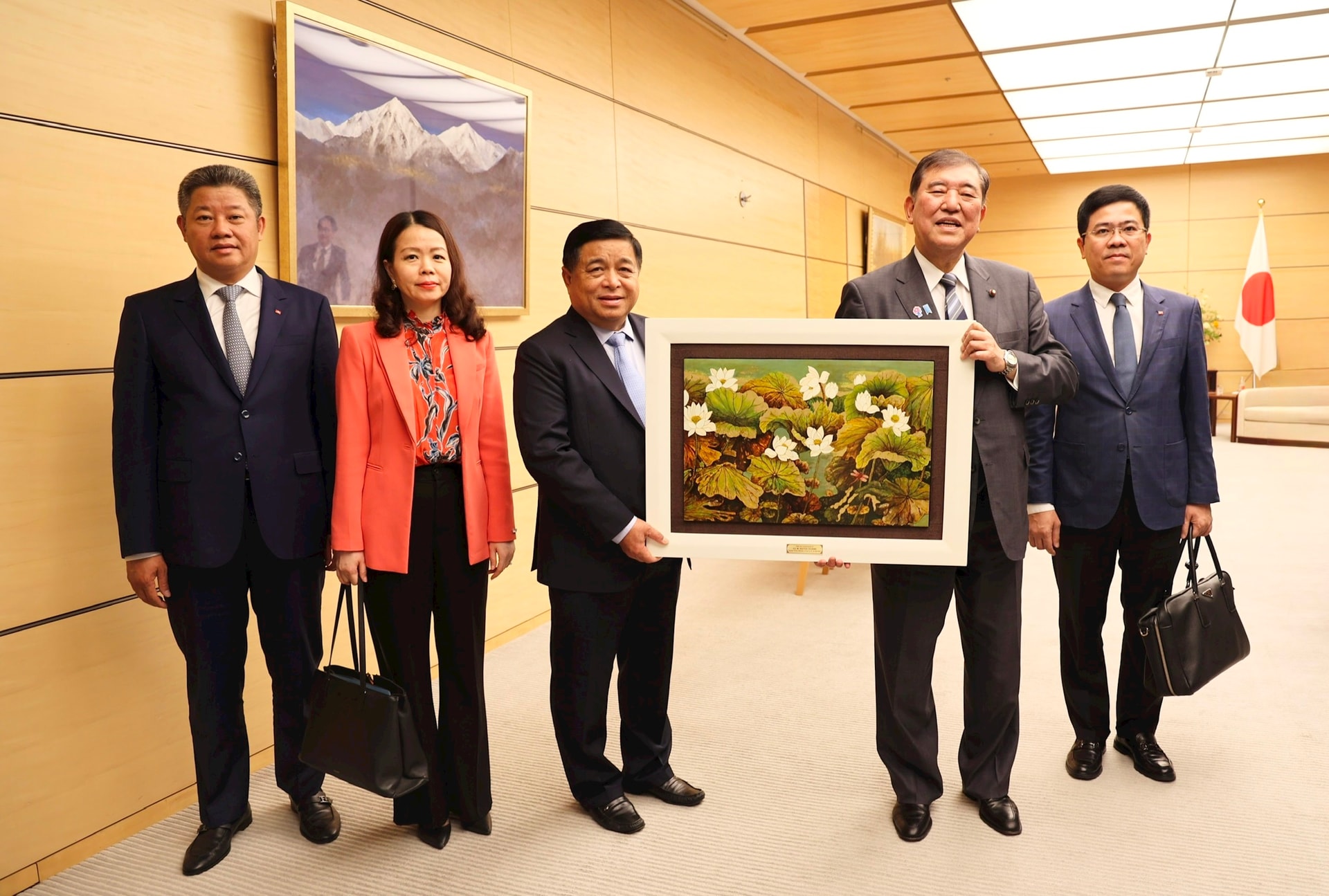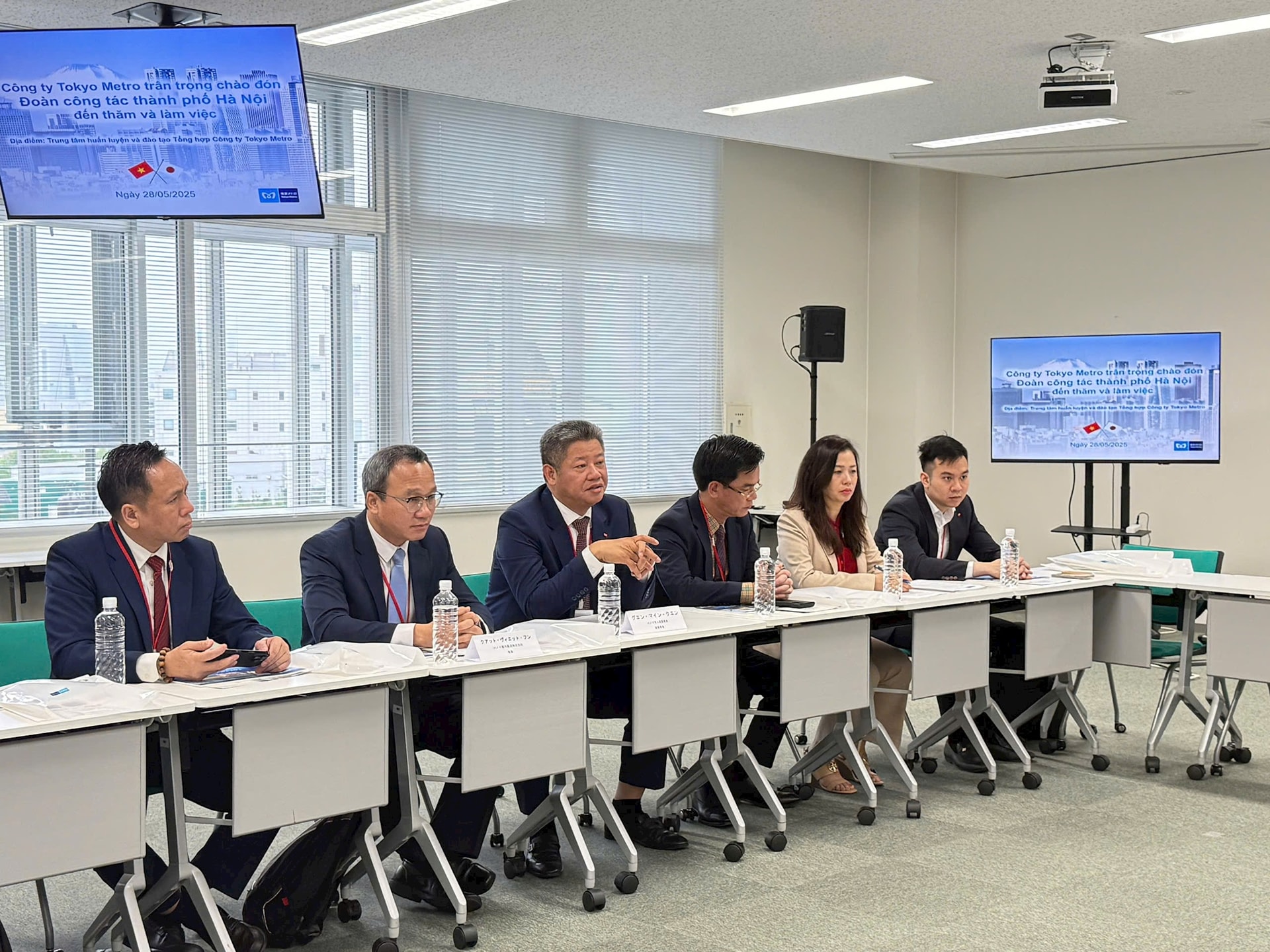Within the framework of the trip, the Hanoi City Delegation took part in a series of official activities alongside the high-level leadership delegation.
Key engagements included a meeting with Japanese Prime Minister Ishiba Shigeru and diplomatic visits with local government leaders, such as the Governors of Hokkaido, Mie, and Gunma Prefectures.
The delegation also held working sessions with leading Japanese enterprises, including Kioxia Semiconductor Group, Rapidus Semiconductor Company, NIDEC Group, and Sumitomo Group.
In addition, the Hanoi delegation participated in major economic and cultural events, notably the Vietnam-Hokkaido Economic Forum and the 17th Vietnam Festival in Japan and met with Vietnamese scientists working in Japan and visited the Vietnamese Embassy in Tokyo.
They also conducted a field survey at Kioxia Group’s Yokkaichi manufacturing plant and explored the AI technology incubator in Aichi Prefecture.

The delegation with Japan Prime Minister Ishiba Shigeru.
As part of Hanoi's 2025 foreign affairs strategy, the municipal delegation advanced key areas of cooperation with Japan, focusing on urban railway development, semiconductor investment, high technology, cultural exchange, and people-to-people ties.
To this end, the delegation held bilateral meetings with Japanese local partners and coordinated a range of cultural exchange activities.
On the morning of May 27, in Mie Prefecture, Vice Chairman of the Hanoi People’s Committee Nguyen Manh Quyen, along with leaders from the city’s High-Tech and Industrial Parks Management Board, held an official working session with Mr. Wantanbe Tomoharu, Executive Vice Chairman of Kioxia Group.
Founded in 2018, Kioxia, formerly known as Toshiba Memory Corporation, is Japan’s leading memory manufacturer, with a market capitalization of approximately US$8.1 billion. The company specializes in developing and manufacturing flash memory (NAND) and solid-state drives (SSD) for applications in cloud computing, smartphones, supercomputers, and automobiles.
During a field survey at Kioxia Group’s Yokkaichi manufacturing plant in Mie Prefecture, the world’s second-largest memory production facility after Samsung, Vice Chairman of the Hanoi People’s Committee Nguyen Manh Quyen proposed that Kioxia consider establishing a semiconductor technology research and development center at Hoa Lac High-Tech Park.
To advance this initiative, he assigned the city’s Management Board of High-Tech and Industrial Parks to lead discussions and promote the signing of a cooperation agreement with the Japanese side.
Following this, on May 28, the Vietnam–Hokkaido Economic Forum took place in Hokkaido Prefecture. The forum served as a key platform for both sides to explore solutions to strengthen economic, trade, and investment ties between Vietnam and Japan, particularly with Hokkaido.
The event was attended by Deputy Prime Minister Nguyen Chi Dung, Hanoi Vice Chairman Nguyen Manh Quyen, and Vietnamese Ambassador to Japan Pham Quang Hieu.

The Hanoi delegation during a meeting with Tokyo Metro.
At the forum, Vice Chairman of the Hanoi People’s Committee Nguyen Manh Quyen delivered a keynote speech highlighting the potential for enhanced cooperation between Hanoi and Hokkaido Prefecture.
He emphasized that Japan has always been one of Hanoi’s most important and trusted partners, with city leaders placing strong emphasis on cultivating practical and effective ties with Japanese localities.
Vice Chairman Quyen noted that recent legislative developments—including the National Assembly’s approval of the Amended Capital Law, the Capital Planning, and the adjustment of Hanoi’s general construction plan—have laid a solid legal foundation for the city to achieve major breakthroughs in the near future.
He also underscored the strategic compatibility between Hanoi and Hokkaido. As a region known for sustainable development, clean agriculture, eco-tourism, and high-quality education, Hokkaido shares many similarities and complementarities with Hanoi’s development goals.
Hanoi hopes to strengthen cooperation and exchange experiences with Hokkaido in key areas such as the economy, digital transformation, semiconductors, high technology, tourism, education, culture, people-to-people exchanges, training partnerships, and high-tech agriculture.
During the working trip in Tokyo, the Hanoi City Delegation visited and held discussions with Wago Group on the afternoon of May 29. The delegation also conducted a field survey of the Wago The Farm model in Chiba Prefecture, which integrates sustainable agriculture with tourism development.
Kiuchi Hirokaz, Chairman of Wago Group, presented the development orientation of the Wago The Farm project in Katori City, Chiba. The project is a model example of combining sustainable agriculture, resort tourism, and experiential education for children. It aims to connect communities with nature, promote a green and sustainable lifestyle, and contribute to the local economic development of Chiba Prefecture.
Founded in 1996, Wago Group is a Japanese corporation known for its application of advanced technologies in production and sustainable agriculture.
During the visit, Vice Chairman of the Hanoi People’s Committee Nguyen Manh Quyen praised the project’s vision and impact. He regarded it as a meaningful and practical model that aligns well with Vietnam’s and Hanoi’s orientation in developing agriculture combined with tourism.
On May 30, the Hanoi delegation, along with representatives from Hanoi Metro Co., Ltd., met with Tokyo Metro to discuss enhancing cooperation in urban railway development.
The meeting was chaired by Noriyoshi Yamagami, Executive Director of Tokyo Metro, who welcomed the delegation and expressed strong interest in receiving guidance from Hanoi’s leadership on future cooperation priorities.
Following a report on the existing partnership between Hanoi Metro and Tokyo Metro, Vice Chairman of the Hanoi People’s Committee Nguyen Manh Quyen proposed several areas for deeper collaboration.
He requested Tokyo Metro’s continued technical support and investment in the development of Hanoi’s urban railway network. He also called for assistance in establishing a practical training center for urban railway operations in Hanoi, as well as expanding experience-sharing, staff training, and exchanges between the two sides.
Additional proposals included cooperation on science and technology applications, particularly in digital transformation and artificial intelligence for railway management, operation, maintenance, and development.
Vice Chairman Quyen also suggested jointly organizing seminars and forums in Hanoi and exploring the possibility of signing an enhanced cooperation agreement to institutionalize and advance the partnership.
In response, Yamagami Noriyoshi Yamagami reaffirmed Tokyo Metro’s strong interest in deepening collaboration with Hanoi. He expressed a commitment to work closely with Hanoi Metro to develop a concrete implementation plan to realize the shared goals.
As part of the visit, the Hanoi City Delegation conducted a field survey of the Tokyo Metro Comprehensive Training and Practice Center. The delegation toured training facilities for engineers and operation technicians, including the training room, simulated station, and technical simulation equipment. Members also experienced Tokyo's urban railway services firsthand.
On May 31, the delegation attended the opening ceremony of the Vietnam Festival at Yoyogi Park in Tokyo. Now in its 17th edition since its launch in 2008, the festival has become a significant cultural exchange event between Vietnam and Japan. It is warmly embraced by the Vietnamese community in Japan and Japanese friends with a deep appreciation for Vietnam.
This year’s event drew the attendance of high-level representatives from the Japanese Government, highlighting the strong and growing bilateral ties.
Within the framework of this event, at the invitation of the Vietnamese Embassy in Japan, Hanoi sent an art troupe comprising performers from the Department of Culture and Sports and the Thang Long Water Puppet Theater to stage a special program titled "Deep Vietnam–Japan Friendship."
The performance featured a series of captivating acts, with a strong emphasis on showcasing the unique art of Vietnamese water puppetry. The aim was to promote and introduce the cultural essence of Vietnam to Japanese audiences and international visitors attending the festival.
This cultural exchange aligns with Hanoi's broader strategic vision, as outlined in Resolution No. 09-NQ/TU issued by the Hanoi Party Committee on February 22, 2022. The resolution focuses on the development of the capital’s cultural industries for the 2021–2025 period, with orientation to 2030 and vision to 2045.
By promoting traditional Vietnamese arts abroad, Hanoi not only strengthens cultural diplomacy but also contributes to tourism development and efforts to attract more international visitors to Vietnam and to the capital in particular.